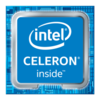Intel Celeron 5205U vs Intel Celeron 5305U
Intel Celeron 5205U
► remove from comparison
The Intel Celeron 5205U is a power efficient entry-level dual-core SoC for notebooks based on the Comet Lake (CML-U) generation and was announced in October 2019. Compared to the similar Whiskey Lake Celeron 4205U processors, the difference is the higher clock speed (+100 MHz) and support for faster memory. The processor cores are clocked at only 1.9 GHz (no Turbo) and don't support SMT / HyperThreading (so only 2 threads). More information on Comet Lake and all the models and articles on it can be found here.
The integrated graphics adapter is still the same as in the previous generations. It is called only Intel UHD Graphics but is still the same Intel UHD Graphics 610 like in the Pentium 4205U. Furthermore, the SoC integrates a VP9 and H.265 de- and encoder and an integrated dual channel LPDDR3-2133/DDR4-2400 memory controller (compared to DDR4-2666 in the faster and costlier Core i3/i5/i7 processors).
Performance
While we have not tested a single system powered by the 5205U as of August 2023, it's safe to expect the chip to be about half as fast as the Core i3-10110U (Comet Lake, 2 cores, 4 threads, up to 4.1 GHz). Which is nothing to write home about, really, as of mid 2022.
Power consumption
This Celeron has a default TDP, also known as the long-term power limit, of 15 W. Intel officialy allows laptop manufacturers to reduce that value somewhat, 12.5 W being the lower limit, resulting in lower clock speeds and lower performance. Unlike most Comet Lake family processors, Celeron 5205U is fairly likely to actually stick to that limitation as its cores are not Boost-enabled.
Last but not the least, this CPU is manufactured on an old, as of late 2022, 14 nm Intel process making for subpar energy efficiency.
Intel Celeron 5305U
► remove from comparison
The Intel Celeron 5305U is a low-power dual-core SoC for laptops, based on the Comet Lake architecture, which was introduced in 2020. Compared to Kaby Lake and Whiskey Lake, there are apparently no differences with Comet Lake apart from the two additional cores in the Top model Core i7-10710U. The processor is still manufactured using the mature 14nm process (14nm++ like Whiskey Lake). The processor cores clock at a fixed 2.3 GHz (no Turbo) and also only offer 2 threads (no HyperThreading). Compared to the more powerful Core i3, i5 and i7 variants, the Celeron does not offer SSE (2) support.
You can find more information about the Comet Lake architecture and the available processors on our Comet Lake topic page.
According to Intel, the integrated graphics card is called Intel UHD Graphics, but is an old Intel UHD Graphics 610. It is clocked in the Celeron 5205U at 300 - 900 MHz and is only sufficient for very demanding games. The CPU also offers an integrated DDR4-2666 / LPDDR4x 2933 / LPDDR3-2133 dual-channel memory controller as well as VP9 and H.265 video decoder and encoder.
Performance
The performance of the Celeron 5305U is in the lowest entry-level class of notebook processors in 2020. Due to the lack of Turbo and only 2 cores, the CPU cannot score points in either single-core or multi-core tasks. The processor is therefore only suitable for undemanding tasks such as surfing with a few tabs and office tasks.
The power consumption and performance can be set from 15 to 12.5 watts by the notebook manufacturer via cTDP-down. However, the processor then only runs at 800 MHz and significantly reduced performance. Even at 15 watts, however, the processor is suitable for thin and light notebooks.
| Model | Intel Celeron 5205U | Intel Celeron 5305U | ||||||||||||||||||||||||||||||||||||||||||||||||||||||||||||||||||||||||||||||||
| Codename | Comet Lake-U | Comet Lake-U | ||||||||||||||||||||||||||||||||||||||||||||||||||||||||||||||||||||||||||||||||
| Series | Intel Comet Lake | Intel Comet Lake | ||||||||||||||||||||||||||||||||||||||||||||||||||||||||||||||||||||||||||||||||
| Series: Comet Lake Comet Lake-U |
|
| ||||||||||||||||||||||||||||||||||||||||||||||||||||||||||||||||||||||||||||||||
| Clock | 1900 MHz | 2300 MHz | ||||||||||||||||||||||||||||||||||||||||||||||||||||||||||||||||||||||||||||||||
| Cores / Threads | 2 / 2 | 2 / 2 | ||||||||||||||||||||||||||||||||||||||||||||||||||||||||||||||||||||||||||||||||
| TDP | 15 Watt | 15 Watt | ||||||||||||||||||||||||||||||||||||||||||||||||||||||||||||||||||||||||||||||||
| Technology | 14 nm | 14 nm | ||||||||||||||||||||||||||||||||||||||||||||||||||||||||||||||||||||||||||||||||
| max. Temp. | 100 °C | 100 °C | ||||||||||||||||||||||||||||||||||||||||||||||||||||||||||||||||||||||||||||||||
| Socket | BGA1528 | BGA1528 | ||||||||||||||||||||||||||||||||||||||||||||||||||||||||||||||||||||||||||||||||
| Features | LPDDR3-2133/DDR4-2400 RAM, PCIe 2, 4 GT/s bus, MMX, SSE, SSE2, SSE3, SSSE3, SSE4.1, SSE4.2, AVX, AVX2, BMI2, ABM, FMA, ADX, VMX, SMEP, SMAP, MPX, EIST, TM1, TM2, SST, AES-NI, RDRAND, RDSEED, SGX | LPDDR3-2133/DDR4-2400 RAM, PCIe 2, 4 GT/s bus, MMX, SSE, SSE2, SSE3, SSSE3, SSE4.1, SSE4.2, AVX, AVX2, BMI2, ABM, FMA, ADX, VMX, SMEP, SMAP, MPX, EIST, TM1, TM2, SST, AES-NI, RDRAND, RDSEED, SGX | ||||||||||||||||||||||||||||||||||||||||||||||||||||||||||||||||||||||||||||||||
| iGPU | Intel UHD Graphics 610 (300 - 900 MHz) | Intel UHD Graphics 610 (300 - 900 MHz) | ||||||||||||||||||||||||||||||||||||||||||||||||||||||||||||||||||||||||||||||||
| Architecture | x86 | x86 | ||||||||||||||||||||||||||||||||||||||||||||||||||||||||||||||||||||||||||||||||
| $107 U.S. | $107 U.S. | |||||||||||||||||||||||||||||||||||||||||||||||||||||||||||||||||||||||||||||||||
| Announced | ||||||||||||||||||||||||||||||||||||||||||||||||||||||||||||||||||||||||||||||||||
| Manufacturer | ark.intel.com | ark.intel.com |
Benchmarks
Average Benchmarks Intel Celeron 5205U → 100% n=2
Average Benchmarks Intel Celeron 5305U → 118% n=2
* Smaller numbers mean a higher performance
1 This benchmark is not used for the average calculation













